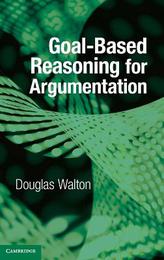
|
Goal-based Reasoning for Argumentation
Hardback
Main Details
| Title |
Goal-based Reasoning for Argumentation
|
| Authors and Contributors |
By (author) Douglas Walton
|
| Physical Properties |
| Format:Hardback | | Pages:301 | | Dimensions(mm): Height 235,Width 156 |
|
| Category/Genre | Philosophy - logic
Artificial intelligence |
|---|
| ISBN/Barcode |
9781107119048
|
| Classifications | Dewey:168 |
|---|
| Audience | | Professional & Vocational | |
|---|
| Illustrations |
2 Tables, unspecified; 59 Line drawings, unspecified
|
|
Publishing Details |
| Publisher |
Cambridge University Press
|
| Imprint |
Cambridge University Press
|
| Publication Date |
25 August 2015 |
| Publication Country |
United Kingdom
|
Description
This book provides an argumentation model for means end-reasoning, a distinctive type of reasoning used for problem-solving and decision-making. Means end-reasoning is modelled as goal-directed argumentation from an agent's goals and known circumstances, and from an action selected as a means, to a decision to carry out the action. Goal-based Reasoning for Argumentation provides an argumentation model of this kind of reasoning showing how it is employed in settings of intelligent deliberation where agents try to collectively arrive at a conclusion on what they should do to move forward in a set of circumstances. The book explains how this argumentation model can help build more realistic computational systems of deliberation and decision-making, and shows how such systems can be applied to solve problems posed by goal-based reasoning in numerous fields, from social psychology and sociology, to law, political science, anthropology, cognitive science, artificial intelligence, multi-agent systems, and robotics.
Author Biography
Douglas Walton is a Canadian academic and author, well known for his many widely published books and papers on argumentation and logic. He is presently Distinguished Research Fellow of the Centre for Research in Reasoning, Argumentation and Rhetoric at the University of Windsor, Canada. Walton's work has been used to better prepare legal arguments and to help develop artificial intelligence. His books have been translated worldwide, and he attracts students from many countries to study with him.
|